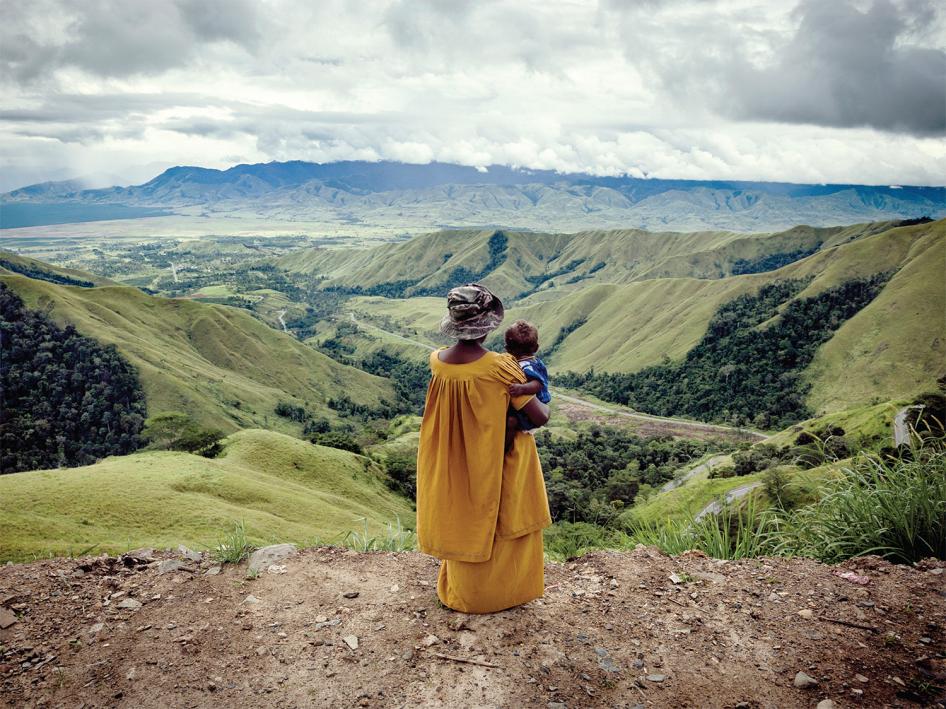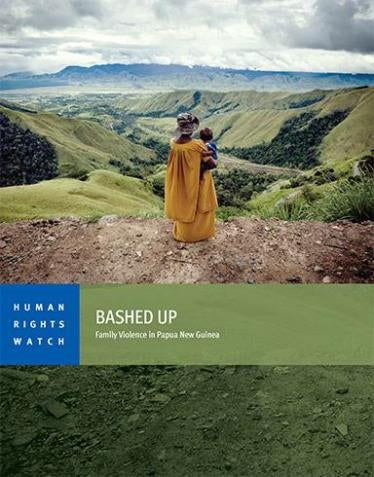Domestic violence occurs everywhere, and in most countries it’s a criminal offense. But in Papua New Guinea – a Pacific nation near Australia experiencing a virtual epidemic of domestic violence – beating your wife often isn’t treated as a crime, although it’s against the law. Family violence happens in a startling two-thirds of Papua New Guinea’s households, according to a government study from 1992 that likely still accurately reflects current reality. Senior Researcher Heather Barr speaks with Amy Braunschweiger about the new report, domestic violence, and why Papua New Guinea’s Family Protection Act has yet to protect victims.
What exactly is happening in terms of domestic violence in Papua New Guinea?
We just don’t see the government and authorities taking violence against women seriously. When a woman shows police a broken arm or a knife slash, officers say, “it’s a family matter, you should go home.” There are not nearly enough shelters and there is no government safety net to help women survive financially and feed their children while they escape a violent partner.
Can Papua New Guinea afford to provide these services?
I find this very frustrating. I’ve done a lot of work on Afghanistan and Bangladesh, which are very, very poor countries. But Papua New Guinea has some money, thanks in part to its amount of natural resources, like copper and gold. Over recent years they’ve become a lower-middle income country. They’re not broke.
Also, Papua New Guinea sees its star as rising. Seventy-five percent of the population of the Pacific Island nations lives here. The country hosted the Pacific Games and built new stadiums, and it will host the 2018 Asia Pacific (APAC) conference, attended by leaders from around the world. But it has some serious problems to resolve if it wants to be seen as a regional and global leader.
One is domestic violence. In 2013, Papua New Guinea passed a new law, the Family Protection Act, designed to tackle this. The law set tough penalties and was designed to make it easier for victims to get protection orders and services. But two years later, the law still isn’t implemented. The government says it needs to draft regulations first, instructing how the law should be applied. That’s good, but it’s not necessary. Also, this certainly shouldn’t take two years. As far as we can tell, no one’s ever been charged with a crime under this act.
Heather Barr, Senior Researcher in Human Rights Watch’s Women’s Rights Division, interviews village court officials about domestic violence in Papua New Guinea’s Highlands.
© 2015 Human Rights Watch
True, the unprecedented diversity of Papua New Guinea population, its rugged terrain, and hundreds of islands can make governing a challenge. The whole world has about 2,500 languages, and roughly 800 are spoken in Papua New Guinea. As of now, the country, which is lush and green, has few roads and even fewer are paved – if you want to have police arrest your husband, it may be a three-day walk to the nearest road. So the government needs to find creative ways of being available to help people in trouble and making sure rule of law isn’t limited to towns and cities.
Why is domestic violence so high there? How is Papua New Guinea different from other countries?
There are harmful practices in some areas that reinforce gender inequality, which increase vulnerability to domestic violence. The man picks the woman he wants to marry and then pays her family a “bride price.” This sometimes makes a man feel that idea that he bought this woman, that he owns her and can do what he wants. Also, the bride price doesn’t just go to the woman’s parents – it may go to her extended family and possibly others in that community. If a woman leaves her husband and goes back to her parents, they have to pay back the bride price. But this is very difficult when the money’s been split between a dozen people that may not be able or willing to pay it back. Although polygamy is illegal in Papua New Guinea, it’s also widely practiced. Over and over we heard stories of husbands taking second wives and getting violent when their first wives object. This can also grow into a situation where two or more wives and their kids depend upon the income of one man. Lots of conflict arises as a result.
Is it hard for women to leave their husbands?
It’s nearly impossible. Imagine if you were married, you didn’t have an income of your own, and you stayed home looking after your six or seven kids, as many women we spoke with did. Your husband’s salary was all you had. The government doesn’t have welfare, food stamps, or emergency housing for such women. Nothing. There’s no program with educational services or job training to help them become financially independent either. How could you leave? Your children may literally starve. I met a lot of women who say that’s why they haven’t left.
What happens when women call the police?
I met one woman, Jenella, who went to the police 17 times trying to get her husband arrested. She’s 39, was married at 14, and has seven children. Her husband was always violent, but it got worse after he took a second wife in 1997, the same year he shattered Jenella’s left arm, which is covered in scars from reconstructive surgery with metal pins. That was the first time she went to the police. She also has scars on her head, where her husband’s second wife hacked her with a knife. When I interviewed Jenella, her right arm was bandaged – her husband had broken it the month before. She’d been to the police every week since then. They just tell her, “You’ve got so many children, you should go home and take care of them.”
Jenella seems pissed off but resigned. She doesn’t believe the police will ever arrest him. Once she managed to bring her husband to the station, and he told the police that they couldn’t lock him up – he had to take care of his kids. So they let him go. But he doesn’t even take care of the children, they’re just his get-out-of-jail-free card.
Now Jenella just wishes he would help her support the children, as he spends most of his time with his other wife.
Did you talk to any police there?
We went to a police station up in the mountainous region. It’s a newer unit that specializes in family and sexual violence, which is a good thing. There were 13 women waiting in a line that stretched out the door.
We asked the police what they did, and they said they counseled the couples. When we asked what that meant, they said that they try and understand what happened, and if it’s clear that one person is being violent to the other, they tell them to stop and send them home. The police said they would often have two or three follow-up sessions with the same couple to see how they were doing. But in the same area, we met a woman named Kere who went to the specialized police unit after receiving a serious head injury when her husband beat her. Her husband would tell the police he’d stop hitting her, then go home and beat her. Kere told the police that he was beating her in between “counseling” sessions with the police. The police warned him again, but that’s all they did. When Kere asked for a protection order, the police said they were too busy.
Do they have any female police officers in Papua New Guinea?
Those were female police officers. Almost all women worked in these specialized family violence centers. Hiring women police is a good step, but you also have to give them right tools and the right marching orders to be able to really help women.
Is there anywhere for women to go if they leave their partners?
There are very few safe houses, and they are rarely located outside of the capital, Port Moresby. Women have to leave the safe house after they get an order of protection, and there’s often nowhere for them to go after that except back to their husband. Most safe houses are run by churches, none are funded by the government. It’s inadequate, to say the least.
What role can other countries play in this?
Papua New Guinea is a former Australian territory, and Australia is by far the country’s largest donor. The reforms that have happened, including these specialized police units and specialized units in hospitals for victims of family and sexual violence came about because of pressure from activists in Papua New Guinea and support from international donors. You know who’s missing here? Papua New Guinea’s government.
If domestic violence isn’t a government priority, how did the Family Protection Act ever get passed?
Activists there are working like crazy day and night, taking risks by sheltering and even hiding women. And their work is paying off. We worked with so many inspiring activists. One woman in particular who I’ll call Mary, helped us find a third of the women we interviewed for the report. She’s fabulous, motherly, and tough. She’s also 47, lives in a rural area, and after her first husband died, she married a violent alcoholic. They’ve been married 17 years.
She went to the village court twice in the 1990s because of him. The first time he tried to break her neck – other people rescued her and stopped him. The court fined him 500 kina ($182), but they never jailed him. The second time he threw a bottle and rock at her head – she has a scar on cheek and upper lip. The court fined him again. “When they throw stones in our face they mean to kill us,” she said. She wanted a divorce but stayed because leaving your husband and remarrying isn’t acceptable in her culture.
Her husband began behaving better when she started working in human rights. It scared him, she said. Sometimes with her work, she hides abused women in her home. When their men threaten to attack her, she’s feels safer with her husband there.
When something is so pervasive, so prevalent, how do you change it?
Papua New Guinea has to enforce the law. It’s passed this good law, but it’s got to take the next step. If people begin to see men go to jail for domestic violence, word will travel fast. People will see that things have changed and the government means business.






